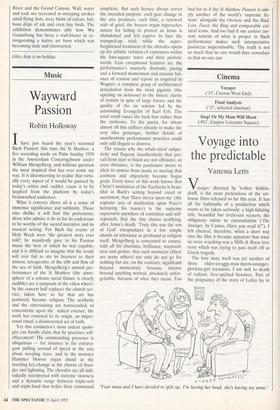Music
Wayward Passion
Robin Holloway
Ihave just heard the year's seasonal Bach Passion; this time the St Matthew, a live recording made on Palm Sunday 1939 in the Amsterdam Concertgebouw under William Mengelberg, and without question the most inspired that has ever come my way. It is disconcerting to realise that virtu- ally every aspect of it would be panned by today's critics and, sadder, cause it to be laughed from the platform by today's brainwashed audiences.
What it conveys above all is a sense of immense significance and sublimity. Those who dislike it will find this portentous; those who admire it do so for its endeavour to be worthy of the sacred narrative and its musical setting. For Bach the events of Holy Week were 'the greatest story ever told'; he manifestly gave to his Passion music the best of which he was capable; and it is difficult to imagine that the result will ever fail to stir its listeners to their utmost, irrespective of the ebb and flow of the sea of faith. Mengelberg's annual per- formances of the St Matthew (the atmo- sphere of a solemn social fixture is clearly audible) are a symptom of the ethos where- by the concert hall replaces the church ser- vice, taken here so far that art has positively become religion. The aesthetic and the entertaining are transcended, to concentrate upon the naked essence; the work has returned to its origin, an imper- sonal ritual, a disinterested act of faith.
Yet this conductor's most ardent apolo- gist can hardly claim that he practises self- effacement! His commanding presence is ubiquitous — for instance in the extrava- gant pulling around of speed in the aria about weeping tears, and in the monster Hammer Horror organ chord at the startling key-change in the chorus of thun- der and lightning. The chorales are all indi- vidually interpreted with extreme slowness and a dynamic range between triple-soft and triple-loud that belies their communal
simplicity. But such licence always serves the intended purpose: each gear change in the aria produces, each time, a renewed stab of grief; the brazen organ reproaches nature for failing to protect as Jesus is abandoned and led captive to face the trumped-up trial; while the super- heightened treatment of the chorales opens up the infinite richness of expression within the four-square tunes and their pietistic words. Less exceptional features are the performance's masterly dramatic pacing and a forward momentum and oceanic bal- ance of tension and repose as required in Wagner; a complete grasp of architectural articulation from the most gigantic (the opening via dolorosa) to the tiniest; clarity of texture in spite of large forces; and the quality of the six soloists led by the astounding Evangelist of Karl Erb. The total result raises the back hair rather than the eyebrows. To the purist, for whom almost all this suffices already to make the very idea grotesque, further details of anachronistic performance practices could only add disgust to distress.
The reason why the whale-sized subjec- tivity and flagrant inauthenticity that pre- vail from start to finish are not offensive, or even obtrusive, is the passionate desire to elicit its utmost from music so moving that coolness and objectivity become bogus goals. Every lover of this work knows that Christ's institution of the Eucharist is beau- tiful in Bach's setting beyond creed or sacrament, that 'Have mercy upon me' (the soprano aria of meditation upon Peter's betraying his master) is the supreme expression anywhere of contrition and self- reproach, that the tiny chorus testifying, after Jesus's death, 'Truly this was the son of God' encapsulates in a few simple chords an utterance as profound as religion itself. Mengelberg is concerned to ensure, with all his charisma, brilliance, wayward- ness and genius, that such moments (there are many others) not only do not go for nothing but are, on the contrary, significant beyond momentary frissons, intense beyond anything normal, absolutely unfor- gettable, because of what they mean. Too
bad for us if the St Matthew Passion is sim- ply another of the world's 'supreme fic- tions' alongside the Oresteia and the Iliad, Lear, Faust, the Ring and comparable cul- tural icons. And too bad if our, costive cur- rent notions of what is proper in Bach performance makes such interpretative grandezza impermissible. The truth is not so much that no one would dare nowadays as that no one can.


























































 Previous page
Previous page